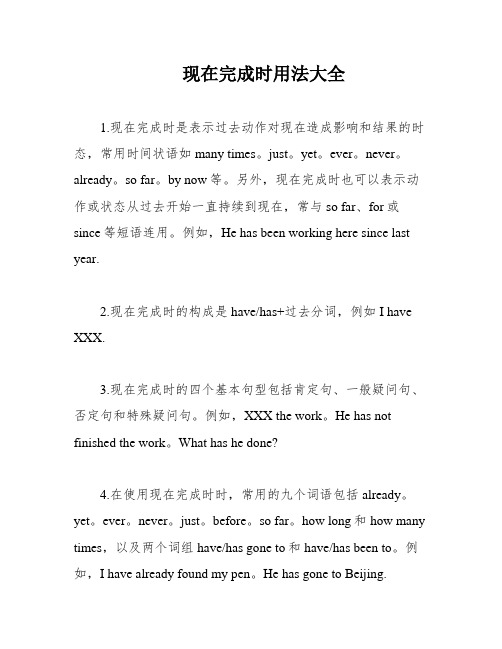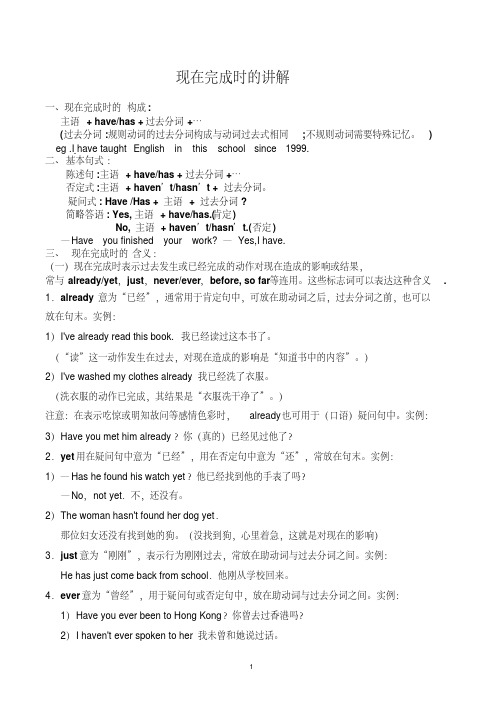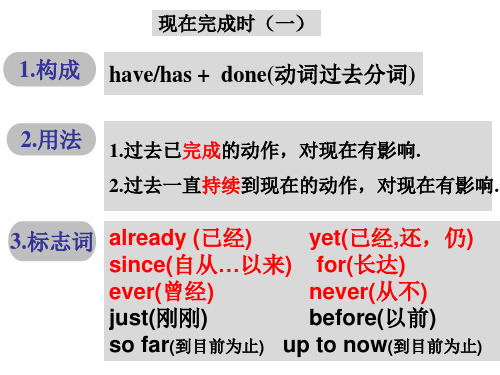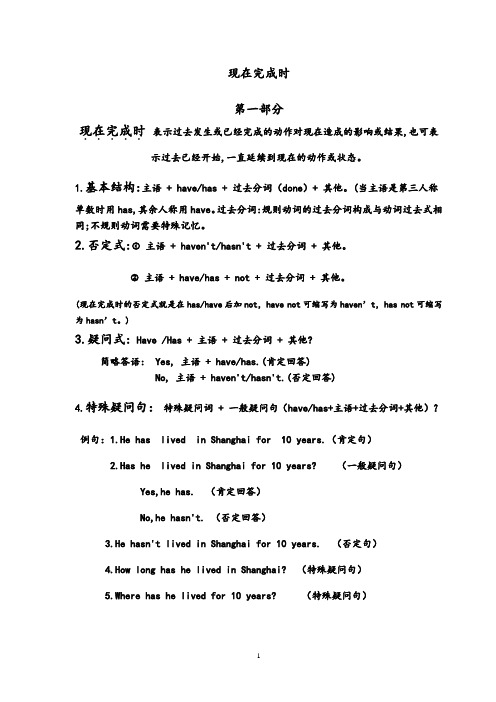现在完成时
现在完成时常用句型

现在完成时常用句型1. “I have already eaten breakfast.” 早上我起来后,妈妈问我:“宝贝,吃早餐了吗?”我拍拍肚子说:“I have already eaten breakfast.”2. “You have juste back from school.” 我一进家门,爸爸就说:“You have juste back from school.”3. “We have played this game before.” 小伙伴们来找我玩游戏,其中一个说:“我们玩这个游戏吧。
”我回答:“We have played this game before.”4. “He has already done his homework.” 我去找小明玩,他妈妈说:“他在房间呢,He has already done his homework.”5. “She has watched this movie many times.” 我们讨论电影的时候,小红说:“这部电影超好看。
”我回应:“She has watched this movie many times.”6. “They have gone to the park.” 我问弟弟妹妹们去哪了,妈妈说:“They have gone to the park.”7. “I have known him for a long time.” 朋友好奇地问我和那个人认识多久了,我笑着说:“I have known him for a long time.”8. “You have read this book, haven't you?” 我拿着书问同桌:“You have read this book, haven't you?”9. “We have visited that place before.” 一家人商量去哪里玩,我突然想起说:“We have visited that place before.”10. “He has made a lot of mistakes.” 老师看着小明的作业说:“He has made a lot of mistakes.”。
完成时态总结

完成时态总结一、现在完成时(Present Perfect)现在完成时用于描述已经发生的动作或事件,与当前的状况或状态有关。
它的结构是“have/has + 过去分词”。
现在完成时常用的情况有以下几种:1.表示过去发生的动作对现在造成的影响或结果。
例如:–I have finished my homework.(我已经完成了作业。
)–She has gone to bed.(她已经上床睡觉了。
)2.表示过去发生的动作与现在持续或重复的动作有关。
例如:–I have visited this museum three times.(我已经参观过这个博物馆三次了。
)–They have lived in this city for five years.(他们在这个城市住了五年了。
)3.表示有经验或经历过某事。
例如:–I have seen that movie before.(我以前看过那部电影。
)–Have you ever been to Paris?(你去过巴黎吗?)4.表示刚刚发生的动作或新闻。
例如:–The plane has just landed.(飞机刚刚降落。
)–I have received an email from my boss.(我收到了老板的邮件。
)二、过去完成时(Past Perfect)过去完成时用于描述在过去某一时间或动作之前已经发生的动作或事件,它的结构是“had + 过去分词”。
过去完成时常用的情况有以下几种:1.表示在过去某一时间点之前发生的动作。
例如:–She had already left when I arrived.(当我到达时,她已经离开了。
)–They had finished dinner before the guests arrived.(客人到达之前,他们已经吃完晚饭了。
)2.表示过去某一动作之前已经完成的动作。
例如:–I had studied English for two years before I moved to Canada.(在我搬到加拿大之前,我已经学习了两年英语。
现在完成时用法大全

现在完成时用法大全1.现在完成时是表示过去动作对现在造成影响和结果的时态,常用时间状语如many times。
just。
yet。
ever。
never。
already。
so far。
by now等。
另外,现在完成时也可以表示动作或状态从过去开始一直持续到现在,常与so far、for或since等短语连用。
例如,He has been working here since last year.2.现在完成时的构成是have/has+过去分词,例如I have XXX.3.现在完成时的四个基本句型包括肯定句、一般疑问句、否定句和特殊疑问句。
例如,XXX the work。
He has not finished the work。
What has he done?4.在使用现在完成时时,常用的九个词语包括already。
yet。
ever。
never。
just。
before。
so far。
how long和how many times,以及两个词组have/has gone to和have/has been to。
例如,I have already found my pen。
He has gone to Beijing.Jim has been living in this city for two months。
Lucy has been living in Beijing since three years ago。
He has been in China since he arrived here。
If there is no time adverb in the sentence。
the present perfect tense is often used to convey the meaning of "already" in Chinese。
For example。
"Have you lost your library book?" can be translated as "你已经弄丢了从图书馆借的那本书吗?"The present perfect tense is also commonly used in the following sentence patterns: "They have planted many trees in the last few years," "This is the best book I have ever read," and "It is the first time I have played computer games."In the present perfect tense。
现在完成时的用法讲解

现在完成时的讲解一、现在完成时的构成:主语+ have/has + 过去分词+…(过去分词:规则动词的过去分词构成与动词过去式相同;不规则动词需要特殊记忆。
) eg .I have taught English in this school since 1999.二、基本句式:陈述句:主语+ have/has + 过去分词+…否定式:主语+ haven’t/hasn’t + 过去分词。
疑问式: Have /Has + 主语+ 过去分词?简略答语: Yes, 主语+ have/has.(肯定)No, 主语+ haven’t/hasn’t.(否定)—Have you finished your work? —Yes,I have.三、现在完成时的含义:(一)现在完成时表示过去发生或已经完成的动作对现在造成的影响或结果,常与already/yet,just,never/ever,before, so far等连用。
这些标志词可以表达这种含义. 1.already意为“已经”,通常用于肯定句中,可放在助动词之后,过去分词之前,也可以放在句末。
实例:1)I've already read this book. 我已经读过这本书了。
(“读”这一动作发生在过去,对现在造成的影响是“知道书中的内容”。
)2)I've washed my clothes already.我已经洗了衣服。
(洗衣服的动作已完成,其结果是“衣服冼干净了”。
)注意:在表示吃惊或明知故问等感情色彩时,already也可用于(口语)疑问句中。
实例:3)Have you met him already ?你(真的)已经见过他了?2.yet用在疑问句中意为“已经”,用在否定句中意为“还”,常放在句末。
实例:1)—Has he found his watch yet ?他已经找到他的手表了吗?—No,not yet.不,还没有。
2)The woman hasn't found her dog yet .那位妇女还没有找到她的狗。
英语语法-现在完成时

—No, he _h_a_s_g_o_n_e_t_o_ the school library. He left five minutes ago.
Exercise
做过,泛泛而谈,标志词,用现在完成时 做过,有明确的过去时间,用一般过去时
It is + 时间段 since +一般过去时的句子.
1. 他的爷爷已经去世2年了。 It is 2 years since his grandpa died.
2. Nick 参军3年了. It is 3 years since Nick joined the army.
3. 他离开深圳好长时间了。 It is a long time since he left Shenzhen. 4. 这本书我已借了4个月了. It is 4 months since I borrowed the book .
3) I’ve just finished Oliver Twist. 我刚看完《雾都孤儿》这本书。
现在完成时构成 have/ has + done (过去分词)
原形-过去式ed-过去分词ed pick → picked → picked wish → wished → wished
like → liked → liked phone→ phoned → phoned
She hasn’t told us the news yet. 3. The rain has already stopped. (改一般疑问句)
Has the rain stopped yet? 4. I have waited here for two hours. (划线提问)
现在完成时的用法

现在完成时的用法现在完成时是英语中的一种时态,用于描述发生在过去某个时间点之前但对现在仍然有影响的动作或状态。
本文将详细介绍现在完成时的用法及相关注意事项。
一、现在完成时的基本结构现在完成时的基本结构由助动词"have"(或其缩写形式"has")+ 过去分词构成。
具体结构如下:肯定句:主语 + have/has + 过去分词否定句:主语 + have not/has not + 过去分词疑问句:Have/Has + 主语 + 过去分词例如:- I have visited London.(我已经去过伦敦。
)- She hasn't finished her homework.(她还没完成作业。
)- Have you ever tried sushi?(你尝试过寿司吗?)二、1. 表示过去开始并一直延续到现在的动作或状态。
例:He has worked at the company for 10 years.(他在这家公司工作已经有10年了。
)2. 表示已经发生的经历或经历过的事情。
例:I have been to Paris twice.(我去过巴黎两次。
)3. 描述过去发生但对现在有影响的动作或状态。
例:They have just finished their project.(他们刚刚完成了他们的项目。
)4. 表示刚刚完成的动作或刚刚发生的事情。
例:We have just moved into a new house.(我们刚刚搬进了新家。
)5. 表示在过去某个时间点之前已经完成的动作或事情。
例:She has already bought the tickets.(她已经买好了票。
)6. 用于带有时间状语的句子,表示在过去某一段时间内已经完成的动作或事情。
例:He has read three books this month.(这个月他已经读了三本书。
现在完成时

现在完成时第一部分现在完成时.....表示过去发生或已经完成的动作对现在造成的影响或结果,也可表示过去已经开始,一直延续到现在的动作或状态。
1.基本结构:主语+ have/has + 过去分词(done)+ 其他。
(当主语是第三人称单数时用has,其余人称用have。
过去分词:规则动词的过去分词构成与动词过去式相同;不规则动词需要特殊记忆。
2.否定式:①主语+ haven't/hasn't + 过去分词+ 其他。
②主语+ have/has + not + 过去分词+ 其他。
(现在完成时的否定式就是在has/have后加not,have not可缩写为haven’t,has not可缩写为hasn’t。
)3.疑问式: Have /Has + 主语+ 过去分词+ 其他?简略答语: Yes, 主语+ have/has.(肯定回答)No, 主语+ haven't/hasn't.(否定回答)4.特殊疑问句:特殊疑问词+ 一般疑问句(have/has+主语+过去分词+其他)?例句:1.He has lived in Shanghai for 10 years.(肯定句)2.Has he lived in Shanghai for 10 years? (一般疑问句)Yes,he has. (肯定回答)No,he hasn't. (否定回答)3.He hasn't lived in Shanghai for 10 years. (否定句)4.How long has he lived in Shanghai? (特殊疑问句)5.Where has he lived for 10 years? (特殊疑问句)①当have/has被用在现在完成时态中时,它可以和前面的代名词一起组成缩写形式。
have可缩写为’ve,has可缩写为’s。
如:I've ,He's②现在完成时用not来表达否定形式。
初三英语现在完成时

9. I haven’t read (not read) the book before.
10. He has
just done (do) it.
11. My sister walked (walk) to school every day last year.
12. We will have (have) an exam again sometime next week.
3经验 表示过去到现在之间曾经历过的事情。常和often, never, ever, once, twice, three times, before, since 等连用。 He has never been ill in his life. I have been to the Summer Palace twice. We have visited your school before.
open-be open/ close- be closed/ die-be dead/ join-be in;
be a member of / begin- be on / come to ; go to-be in; at/ 等。
3 have /has been to 与 have/has gone to have/has been to 去过某地 have/has gone to 去了某地 have/has been in 在某地 She has been to Shanghai twice.
2点动词 点动词也叫终止性动词,不能延续。因此这种动词不能与表示 延续的时间状语连用。
He has been dead for 4 years.
He has been dead since 4 years ago.
- 1、下载文档前请自行甄别文档内容的完整性,平台不提供额外的编辑、内容补充、找答案等附加服务。
- 2、"仅部分预览"的文档,不可在线预览部分如存在完整性等问题,可反馈申请退款(可完整预览的文档不适用该条件!)。
- 3、如文档侵犯您的权益,请联系客服反馈,我们会尽快为您处理(人工客服工作时间:9:00-18:30)。
【语法】现在完成时
一、现在完成时的基本句式:
结构:
变否定句:
变一般疑问句:
二、现在完成时的用法
1)表示之前已经发生的或完成的动作或状态,对现在造成的影响
They have gone to Beijing. (强调现在他们人已经不在这儿了)
I have eaten my lunch. (强调现在已经不饿了)
【注意】already与yet的区别:
I have already finished my homework.
I haven’t finished my homework yet.
Have you finished your homework yet?
2)表示过去已经开始并一直持续到现在的动作或状态. (for+一段时间,since+过去时间点) My uncle has worked here for five years.
Mr Black has taught in China since 2000.
【注意】此种用法中动词应该用延续性动词
判断正误:
I have brought the book for three months.
How long has your older brother joined the army.
三、现在完成时与一般过去时的区别:
1.一般过去时表示过去某时发生的动作或单纯叙述过去的事情,强调动作;现在完成时为过去发生的,强调过去的事情对现在造成的影响,强调影响。
I saw this film yesterday. (强调看的动作发生过了)
I have seen this film. (强调对现在的影响,电影的内容已经知道了)
2.如果句子中出现明确的具体表过去的时间状语,用______;
判断正误:
Tom has written a letter to his parents last night.
四、延续性与非延续性动词
1. The old man died 4 years ago.
The old man has been dead for 4 years.
I borrowed the book 5 days ago.
I have kept the book since 5 days ago.
2.It is/has been three years since I brought the boo
【注意】
1) 含有明确的过去时间状语的句子一般用________时,
Just now Jim ______(come) to see you.
2)现在完成时常与for,since等引导的时间状语连用。
我在这里住了10年。
(现在仍住这儿)
我在这里住过10年。
(现在不住这儿了)
Have been to, have gone to, have been in的区别:。
